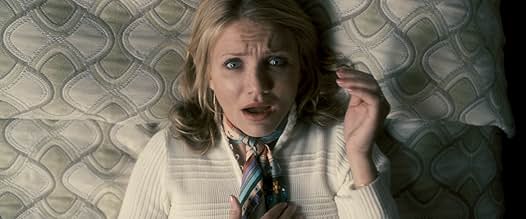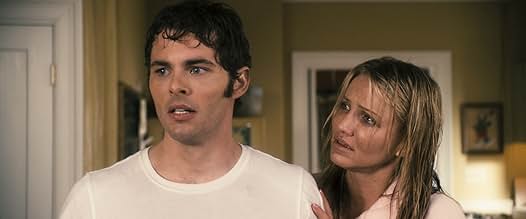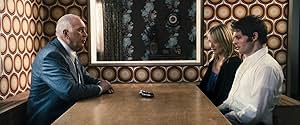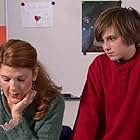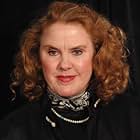With the press of a button, a wooden box bestows riches and death.With the press of a button, a wooden box bestows riches and death.With the press of a button, a wooden box bestows riches and death.
- Director
- Writers
- Stars
- Awards
- 1 win & 6 nominations total
Mark S. Cartier
- Martin Teague
- (as Mark Cartier)
- Director
- Writers
- All cast & crew
- Production, box office & more at IMDbPro
Featured reviews
I'm not gonna lie. To say that this movie is confusing is like saying the sun is hot but not really. And if you've seen cult director Richard Kelly's previous films, "Donnie Darko" and "Southland Tales," you know that's gotta mean something. When I went to see this movie, there were about 50 people in the theater. Before an hour into the film, about half of the audience had already walked out. By the end, there were only 15 people left wondering what in the hell did they just see. I for one could only comprehend roughly 40% of what I saw on- screen, and even then it can only be called interpretation. So why did I give this movie a generous seven stars? Because for one, we get some spectacular performances (Marsden's great and Langella returns as a familiar creepy character), and most importantly two, because it's entirely original and Richard Kelly, undoubtedly one of the bravest directors alive, uses his creative vision to tell a story that dares to be different. Quite frankly, it's the ONLY way - only through Kelly's unique style could this story be told the way it's intended.
In the end, if you're not willing to spend some serious thought into an intelligent movie (and even then it may all amount to nothing), stay FAR away from this one. But if you want to watch a deep, rich, complex and thought-provoking piece on spirituality, existentialism, and the predictability of human nature, go see this. Be prepared for lengthy discussions with your partner however.
*Note: If by chance you've read this review, taken my recommendation, have actually seen the movie and STILL believe you've wasted 2 hours of your life, I'd be happy to share my views on the whole meaning and plot of the film. See, that's why I liked it so much - it promotes discussion! As hard as it is though, I'll try summing it up by paraphrasing a rather depressing quote by Langella's character, who explains the significance of the simple box to an employee: "Your house is a box which you live in. The car that you drove to work is a box, on wheels. When you return home from work you sit in front of a box with moving images. You watch until the mind and soul rots and the box that is your body deteriorates, when finally you are placed into the ultimate box... to rest under the soil and earth."
In the end, if you're not willing to spend some serious thought into an intelligent movie (and even then it may all amount to nothing), stay FAR away from this one. But if you want to watch a deep, rich, complex and thought-provoking piece on spirituality, existentialism, and the predictability of human nature, go see this. Be prepared for lengthy discussions with your partner however.
*Note: If by chance you've read this review, taken my recommendation, have actually seen the movie and STILL believe you've wasted 2 hours of your life, I'd be happy to share my views on the whole meaning and plot of the film. See, that's why I liked it so much - it promotes discussion! As hard as it is though, I'll try summing it up by paraphrasing a rather depressing quote by Langella's character, who explains the significance of the simple box to an employee: "Your house is a box which you live in. The car that you drove to work is a box, on wheels. When you return home from work you sit in front of a box with moving images. You watch until the mind and soul rots and the box that is your body deteriorates, when finally you are placed into the ultimate box... to rest under the soil and earth."
I read the original Richard Matheson short story (Button, Button) that this movie is based on when it was first published in the June 1970 Playboy Magazine. The short story was a relatively simple morality tale. Usually I am not one to compare source material with movies. They are totally separate animals and frequently the movie version is a big improvement on the original material.
In this case, the two cannot even be compared - even the plot is barely recognizable in the movie version. That would be fine if the movie plot were an improvement. Instead we have a mush mash of hints, bloody noses and awkward special effects.
I guess it is still a morality tale, but an overly complicated one. The performers do the best they can.
In this case, the two cannot even be compared - even the plot is barely recognizable in the movie version. That would be fine if the movie plot were an improvement. Instead we have a mush mash of hints, bloody noses and awkward special effects.
I guess it is still a morality tale, but an overly complicated one. The performers do the best they can.
It seems that most either hate or love this film with nothing in between. I have seen people say it was "hateful" or "they didn't understand the ending" I will simply say, a number of people just did not understand the film at all.
I personally thought it was better than Donnie Darko, as Kelly went out of his way to be weird for the sake of it in that film. This seemingly had a bit more meaning behind it.
To those who found the script hateful, it simply isn't do not allow that opinion to keep you from watching this movie. If anything the script shows you that greed and the error of our ways do have consequences and could harm those we love. That isn't hateful, but more of a message alerting us that our every decision is indeed important.
Do not be scared away by those who ranked the film at four and below, this is a movie for those who want to be challenged to think outside the normal boundaries of everyday thought. If you're up to that challenge it's worth seeing, although certain areas could be done better.
It was nice to see Cameron do a serious role, but she did seem at times rusty at portraying some of the emotions needed for such a role. At others she nailed what she needed to deliver. James Mardsen (Arthur Lewis) and Frank Langella (Arlington Steward) both delivered consistent performances.
I personally thought it was better than Donnie Darko, as Kelly went out of his way to be weird for the sake of it in that film. This seemingly had a bit more meaning behind it.
To those who found the script hateful, it simply isn't do not allow that opinion to keep you from watching this movie. If anything the script shows you that greed and the error of our ways do have consequences and could harm those we love. That isn't hateful, but more of a message alerting us that our every decision is indeed important.
Do not be scared away by those who ranked the film at four and below, this is a movie for those who want to be challenged to think outside the normal boundaries of everyday thought. If you're up to that challenge it's worth seeing, although certain areas could be done better.
It was nice to see Cameron do a serious role, but she did seem at times rusty at portraying some of the emotions needed for such a role. At others she nailed what she needed to deliver. James Mardsen (Arthur Lewis) and Frank Langella (Arlington Steward) both delivered consistent performances.
As a fan of science fiction allegory, social experiment, "The Twilight Zone" and the thriller genre -- no less all those elements combined -- Richard Kelly and his film "The Box" should've at least won me over, but it doesn't. It can't even decide if it wants to remain completely mysterious or explicitly tell us what's going on and any film that has to contemplate that is too complex for its own good.
With any story this daring, there's potential for something meaningful. "The Box" does let you glimpse it and draw a few interesting conclusions, but through intellectual jail bars placed before our eyes by the myriad of plot contrivances. In other words, too many plot elements exist in in the film that keep us from ever putting our mind around what Kelly is trying to say. Although he starts simply by focusing on a couple (James Marsden and Cameron Diaz) and their child making an ethical decision, the scope widens to include everything from Arthur C. Clarke references to mindless drones to some indiscernible notion of the afterlife.
This beginning piece is based on Richard Matheson's story "Button, Button," which was a short story turned into a "Twilight Zone" episode. In "The Box," a mysterious man with a half-burned face played by Frank Langella drops off a box with a button in it at the doorstep of Norma and Arthur Lewis and their son Walter. He later comes back and gives Norma a proposition: don't press the button and nothing happens, or press the button and receive one million dollars and subsequently someone, anywhere in the world, whom they don't know will die.
Well, Norma, a teacher, just lost her teacher tuition discount for her son and Arthur's application to be an astronaut was just denied and despite living in a nice looking house in Richmond, Virginia they apparently have no money, so it's not hard to figure out ultimately what they'll do. After all, don't press the button and there's no film -- not that some people who sit through this would've minded that in retrospect.
As with his cult hit "Donnie Darko," Kelly keeps "The Box" fascinatingly creepy. It starts with the colors, the classic string soundtrack from the band Arcade Fire and some peculiar Easter eggs and moves on to more jarring occurrences. There is never a point where things get so absurd that you don't care what happens in the end, even if there's a chance the end could be terribly unsatisfying. It's one of few saving graces for "The Box," but perhaps even this is only for those intrigued by high concept sci-fi mystery that parallels human nature no matter how vague.
When any thriller collapses somewhere after the midway point, you can usually blame the fact that too many occurrences in need of explaining were written in order for the writer to achieve his desired end. When James Marsden gets hit in a car by a truck and comes out of a giant light warehouse and that ultimately never gets explained, its degrading to the viewer.
The real trouble with "The Box" is how ambitiously it tries to combine the ideas of intelligent life/space exploration with religious notions of life, death and what might come after as well as numerous other elements too many and too difficult to explain. Kelly found that balance between time travel and inter-relationship drama in "Donnie Darko" but "The Box" implodes on itself by severing its little social experiment from the characters with too much unexplained phenomena.
~Steven C
Visit my site http://moviemusereviews.com
With any story this daring, there's potential for something meaningful. "The Box" does let you glimpse it and draw a few interesting conclusions, but through intellectual jail bars placed before our eyes by the myriad of plot contrivances. In other words, too many plot elements exist in in the film that keep us from ever putting our mind around what Kelly is trying to say. Although he starts simply by focusing on a couple (James Marsden and Cameron Diaz) and their child making an ethical decision, the scope widens to include everything from Arthur C. Clarke references to mindless drones to some indiscernible notion of the afterlife.
This beginning piece is based on Richard Matheson's story "Button, Button," which was a short story turned into a "Twilight Zone" episode. In "The Box," a mysterious man with a half-burned face played by Frank Langella drops off a box with a button in it at the doorstep of Norma and Arthur Lewis and their son Walter. He later comes back and gives Norma a proposition: don't press the button and nothing happens, or press the button and receive one million dollars and subsequently someone, anywhere in the world, whom they don't know will die.
Well, Norma, a teacher, just lost her teacher tuition discount for her son and Arthur's application to be an astronaut was just denied and despite living in a nice looking house in Richmond, Virginia they apparently have no money, so it's not hard to figure out ultimately what they'll do. After all, don't press the button and there's no film -- not that some people who sit through this would've minded that in retrospect.
As with his cult hit "Donnie Darko," Kelly keeps "The Box" fascinatingly creepy. It starts with the colors, the classic string soundtrack from the band Arcade Fire and some peculiar Easter eggs and moves on to more jarring occurrences. There is never a point where things get so absurd that you don't care what happens in the end, even if there's a chance the end could be terribly unsatisfying. It's one of few saving graces for "The Box," but perhaps even this is only for those intrigued by high concept sci-fi mystery that parallels human nature no matter how vague.
When any thriller collapses somewhere after the midway point, you can usually blame the fact that too many occurrences in need of explaining were written in order for the writer to achieve his desired end. When James Marsden gets hit in a car by a truck and comes out of a giant light warehouse and that ultimately never gets explained, its degrading to the viewer.
The real trouble with "The Box" is how ambitiously it tries to combine the ideas of intelligent life/space exploration with religious notions of life, death and what might come after as well as numerous other elements too many and too difficult to explain. Kelly found that balance between time travel and inter-relationship drama in "Donnie Darko" but "The Box" implodes on itself by severing its little social experiment from the characters with too much unexplained phenomena.
~Steven C
Visit my site http://moviemusereviews.com
The trailer goes nowhere near and only scratches the surface of the film and rightly so too, not because it has that obligation to keep its real narrative under wraps, but because what actually transpires, will provoke entirely different lines of questioning, some of which are frustratingly not answered in the film, leaving you to your own devices to interpret the series of events. Which of course means plenty of material for an after-show discussion.
Metaphorically, the box refers to how us humans tend to subconsciously hole ourselves into situations or things in everyday life, and how our enclosed thoughts tend to see things from a certain perspective, seldom out of the box. There's a speech made near the end by one of the characters that will leave you pondering over this fact, which governs the basis of the entire film, and even threading on existentialism, where our bodies are mere vessels for the soul, and from cradle to the grave we put ourselves in more boxes in a way of life fashion.
What I disliked about the film, is how it tried to sound intelligent through the frequent name dropping of covert government agencies like the CIA and NSA, as though there's something overtly clandestine about these agencies that we should be aware of. They serve little purpose other than to put every action and every person under scrutiny, that nobody can be trusted, wrecking havoc in a sense to both the characters and the audience as we try to keep up with trust issues to aid in the interpretation of the narrative. Having it set in 1976, against a NASA backdrop of manned space missions, and in Langley, Virginia, also provided that heightened sense of wary that will sap your energies as you sit through it patiently.
Based upon the short story Button, Button written by Richard Matheson and made into an episode of the Twilight Zone, the story follows the Lewis family, where husband Arthur (James Marsden) works at NASA and develops a prosthetic foot for his teacher wife Norma (Cameron Diaz), and you'd think it's all happy family with their son Walter (Sam Oz Stone), until one day a mysterious man called Arlington Steward (Frank Langella in a Two-Face inspired facial effect) whom we are preempted of in the opening, comes knocking and giving them a Deal or No Deal button in a box. Plunge the button and they'll get a million bucks (we're talking in dollar terms of the 70s here) although a stranger out there will die. If they don't, well the deal's got an expiry date.
The story would dictate a deal be made, which of course sparks off a mysterious sequence of events that unfold, with even more shady characters (who nosebleed) appearing, some whom are inexplicably zombie like, apparently all under the influence, or employment, or Arlington Steward. Whether or not Steward is Death, a clandestine government employee, a messenger from God or a representative of Aliens after an anal probe, remains unanswered, so whichever way you look at it, it's as if he's delivering something expected, just begging that mankind will shake off its innate greed so that his work can be cut short and to return to wherever he came from.
If you need a little distraction from the disparate scenes which make up the narrative, the production sets and art direction are gorgeous in recreating the 70s look, as you try to figure out the mystery of the consequences that stem from a result of not fully understanding the fine print. It's full circle this examination of human nature, of our greed for immediate gratification, manifesting its result in longer term pain, confusion and further choices that we'll make based on real sacrifices. Nifty special effects come into play as well, though it just leaves more room open as to the genre of the film.
So is it horror, science fiction, or a mystery thriller? It's everything rolled into one actually, together with a sprinkling of the philosophical. Just don't go expecting a straight narrative film with clean and easy answers at the end – this is like an X-Files episode on steroids.
Metaphorically, the box refers to how us humans tend to subconsciously hole ourselves into situations or things in everyday life, and how our enclosed thoughts tend to see things from a certain perspective, seldom out of the box. There's a speech made near the end by one of the characters that will leave you pondering over this fact, which governs the basis of the entire film, and even threading on existentialism, where our bodies are mere vessels for the soul, and from cradle to the grave we put ourselves in more boxes in a way of life fashion.
What I disliked about the film, is how it tried to sound intelligent through the frequent name dropping of covert government agencies like the CIA and NSA, as though there's something overtly clandestine about these agencies that we should be aware of. They serve little purpose other than to put every action and every person under scrutiny, that nobody can be trusted, wrecking havoc in a sense to both the characters and the audience as we try to keep up with trust issues to aid in the interpretation of the narrative. Having it set in 1976, against a NASA backdrop of manned space missions, and in Langley, Virginia, also provided that heightened sense of wary that will sap your energies as you sit through it patiently.
Based upon the short story Button, Button written by Richard Matheson and made into an episode of the Twilight Zone, the story follows the Lewis family, where husband Arthur (James Marsden) works at NASA and develops a prosthetic foot for his teacher wife Norma (Cameron Diaz), and you'd think it's all happy family with their son Walter (Sam Oz Stone), until one day a mysterious man called Arlington Steward (Frank Langella in a Two-Face inspired facial effect) whom we are preempted of in the opening, comes knocking and giving them a Deal or No Deal button in a box. Plunge the button and they'll get a million bucks (we're talking in dollar terms of the 70s here) although a stranger out there will die. If they don't, well the deal's got an expiry date.
The story would dictate a deal be made, which of course sparks off a mysterious sequence of events that unfold, with even more shady characters (who nosebleed) appearing, some whom are inexplicably zombie like, apparently all under the influence, or employment, or Arlington Steward. Whether or not Steward is Death, a clandestine government employee, a messenger from God or a representative of Aliens after an anal probe, remains unanswered, so whichever way you look at it, it's as if he's delivering something expected, just begging that mankind will shake off its innate greed so that his work can be cut short and to return to wherever he came from.
If you need a little distraction from the disparate scenes which make up the narrative, the production sets and art direction are gorgeous in recreating the 70s look, as you try to figure out the mystery of the consequences that stem from a result of not fully understanding the fine print. It's full circle this examination of human nature, of our greed for immediate gratification, manifesting its result in longer term pain, confusion and further choices that we'll make based on real sacrifices. Nifty special effects come into play as well, though it just leaves more room open as to the genre of the film.
So is it horror, science fiction, or a mystery thriller? It's everything rolled into one actually, together with a sprinkling of the philosophical. Just don't go expecting a straight narrative film with clean and easy answers at the end – this is like an X-Files episode on steroids.
Storyline
Did you know
- TriviaThe main characters, Norma Lewis and Arthur Lewis, were based on director Richard Kelly's parents. His mother also suffered a crippled foot after an X-Ray mishap; his father worked for NASA and co-designed the camera used on the Viking Mars Landers (as in the movie).
- Goofs911 emergency services weren't available in Richmond, VA, in 1976.
- Quotes
Martin Teague: Sir? If you don't mind my asking... why a box?
Arlington Steward: Your home is a box. Your car is a box on wheels. You drive to work in it. You drive home in it. You sit in your home, staring into a box. It erodes your soul, while the box that is your body inevitably withers... then dies. Whereupon it is placed in the ultimate box, to slowly decompose.
Martin Teague: It's quite depressing, if you think of it that way.
Arlington Steward: Don't think of it that way... think of it as a temporary state of being.
- SoundtracksLight in Your Eyes
Written by Stephan Sechi (as Stephan M. Sechi)
Performed by Stephan Sechi
Courtesy of Crucial Music Corporation
- How long is The Box?Powered by Alexa
Details
- Release date
- Country of origin
- Official site
- Language
- Also known as
- La caja
- Filming locations
- Production companies
- See more company credits at IMDbPro
Box office
- Budget
- $30,000,000 (estimated)
- Gross US & Canada
- $15,051,977
- Opening weekend US & Canada
- $7,571,417
- Nov 8, 2009
- Gross worldwide
- $33,334,176
- Runtime1 hour 55 minutes
- Color
- Sound mix
- Aspect ratio
- 2.35 : 1
Contribute to this page
Suggest an edit or add missing content








